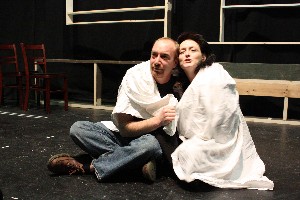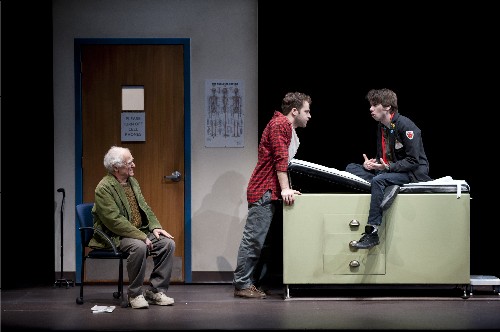Theater Review: Down Chekhovian Way
A Chekhovian dramatic fabric calls for a tough/tender gift for realism. Getting the balance right is tricky—too much reassurance veers toward easy sentimentality, while excessive punishment pushes the proceedings toward soap opera.
Walking the Volcano by Jon Lipsky. Directed by Elaine Vaan Hogue. Presented by Playwrights’ Theatre at Boston University and Boston Center for American Performance at the Boston Playwrights’ Theatre, through May 1.
Sons of the Prophet by Stephen Karam. Directed by Peter DuBois. Drected by Peter DuBois. Presented by the Huntington Theatre Company at the Calderwood Pavilion at the BCA, through May 1.
By Bill Marx

A comfortable moment between Gabriel Kuttner and Paula Langton in WALKING THE VOLCANO. Photo: Boston Playwrights
William Shakespeare famously referred to life as “a mingled yarn” of pleasure and pain, loss and reward, comedy and tragedy, and throughout the centuries other playwrights have tried to make the weave just right. Getting the balance right is tricky—too much reassurance veers toward easy sentimentality, while excessive punishment pushes the proceedings toward soap opera. In his plays Chekhov mixes the polarities perfectly; as their way of life slides into extinction, the psyches of his complex figures spin up, down, and around.
A Chekhovian dramatic fabric calls for a tough/tender gift for realism, which makes the production of Walking the Volcano by the late Jon Lipsky a bittersweet experience. He was a superb playwright, and his best scripts for me, such as Living in Exile, Dreaming With an AIDS Patient, explore life under extreme pressure, generating lyrical visions of existence outside of a prosaic context. In the Boston Globe obituary for Lipsky, Lesile Epstein, the director of BU’s Creative Writing Program, credits him as a writer whose works offers “strength, optimism, a kind of theatrical spirituality.” He is spot-on—I still remember being bowled over by the brusque revelatory power of Living in Exile at its TheatreWorks premiere. Here was a rare contemporary playwright who was at ease with matters mythic and mystic.
The more realistic Lipsky scripts that I have seen reflect his intelligent craftsmanship and determined humanism but lack the unruly depths of his more ambitious works—The Survivor: A Cambodian Odyssey and Maggie’s Riff are dutiful and well-meaning to a fault. I had the same reaction watching Walking the Volcano, eight short plays about highly fraught relationships between men and women—the pieces are tightly focused, generally intelligent, and stuffed with emotional fireworks, bright bursts of anger and lust, regret and disgust, fear and love. But it is an evening of flares rather than rockets, the trajectory of the scripts inevitably leaning toward sentimental and predictable payoffs.
As a dramatist, Lipsky’s great power is to expand boundaries, not to create exquisite miniatures. Through the use of pop tunes and news bulletins, director Elaine Vaan Hogue tries to suggest a larger chronological meditation on shifting American mores though time, but the dramaticules that make up Walking the Volcano do not add up into a larger statement about the “mingled yarn” of human relationships or the decadence of American society.
Of course, Walking the Volcano proffers flashes of Lipsky’s brilliance as a writer, such as a wonderfully weird episode that revolves around a couple in a bath room on a jet in flight talking about smuggling drugged snakes through customs, and there are some striking images, such as talk between a daughter and father, a female breast filled with gall. At one point a character reflects that life takes place somewhere between “the mess and the mythic”—moments here remind us that Lipsky could straddle both realms.
Director Vaan Hogue pitches the production too high, especially during its first half, but the cast is nimble, if a bit too ready to embrace stereotypes: the rock singer hellbent on making it, an aging and disgruntled actress taking on a risky role, a gambler once more betting against the relationship odds, a older couple seeking forgiveness as mortality beckons. The younger performers, Jess Moss and Brian Vaughan, are energetic, while the middle-aged cast members, Gabriel Kuttner and Paula Langton, evoke a comfortable acceptance that could sail over any volcano.

Yusef Bulos (Bill), Kelsey Kurz (Joseph), and Dan McCabe (Charles) in SONS OF THE PROPHET. Photo: Paul Marotta.
As for Sons of the Prophet, receiving its world premiere via the Huntington Theatre Company (on its way to a Roundabout Theater Company production in New York this fall), young dramatist Stephen Karam strikes me as a promising playwright in the tragicomic Chekhovian vein. (Note the epigraph from Chekhov in the program.) I missed the production of Speech & Debate at the Lyric Stage, so this script’s modestly humane sensibility, at its best a clear-eyed marriage of sweet empathy and sardonic comic distance, comes as a welcome surprise, a look at contemporary America that doesn’t feed off of (i.e. exploit) the dog-eat-dog ethos of Reality TV.
The plot set up is standard: very bad things happen to good people for inscrutable reasons. In this case the focus is on two gay brothers, Joseph and Charles Douaihy, who live in eastern Pennsylvania. Their father dies of a heart attack after he has a serious car accident triggered by a prank of a high school kid. The student is a star football player, which raises public issues about punishment for the crime in a sports-crazed culture. Meanwhile, Joseph’s life is a challenge—an impossible boss, enigmatic health issues, and his aging Uncle Bill’s seriously declining health.
Karam is a theatrical fledgling, and the play’s lack of thematic focus, its scatter shot approach to jokes and pathos, irritates. The playwright brings in a new character in the final scene to tell the audience and Joseph what the play has been about. There are moments when the dramatist doesn’t know how to move characters off stage and lazy lapses into caricature, especially the use of figures, such as the ultra-neurotic woman and the cranky old man, who serve as convenient comedy crutches. For a play about the enormous challenge of dealing with pain, there are too many characters who are incapable of feeling any, or only do so in lampoon form.
But there are perceptive moments in Sons of the Prophet that blend dark wit, ache, and tribulation. Impatient and easily riled, Joseph is not served up as a likable character, yet his struggle to make sense of his mysterious ailments, to do right by his uncle, to have a meaningful romantic relationship, and to deal with the death of his father carries considerable power. This is an unusual play that dramatizes the way people are pounded by reality into learning something useful about themselves.
Peter DuBois’s direction moves along with sensitive understanding, riding amiably over the rough spots to highlight the script’s stronger scenes. The cast provides strong characterizations, especially Kelsey Kutz’s bedeviled Joseph and the righteous bluster of Yusef Bulos’s Bill. The supporting performers, from Lizbeth Mackay’s omni-nice kindergarten teacher to the calming medicos of Dee Nelson (Full Disclosure: Dee is a friend.), provide reassuring wafts of humanity. Let’s hope Sons of the Prophets is prophetic of even better plays to come from Karam.
Tagged: Boston Playwrights Theatre, Huntington-Theatre-Company, Jon Lipsky, Sons of the Prophet, Stephen Karam

Chekhov is the Russian Horton Foote.